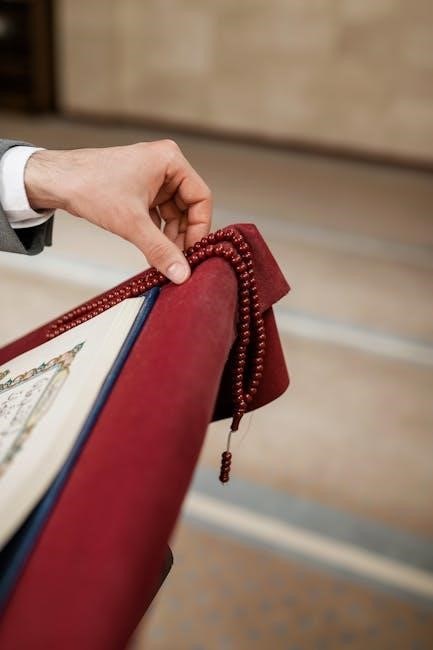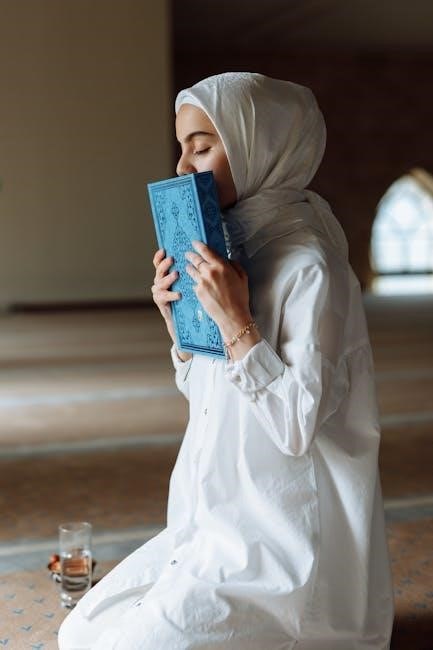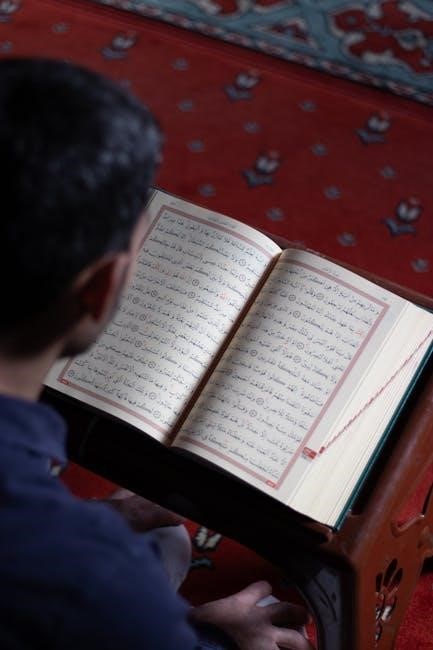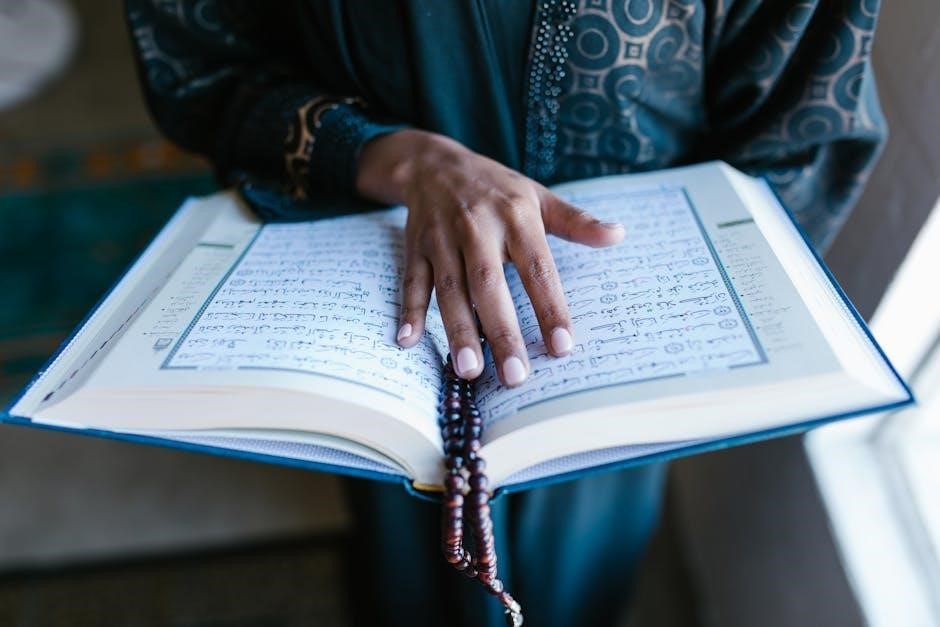Welcome to “Being Muslim: A Practical Guide,” a comprehensive resource for understanding Islam’s teachings and practices. This guide offers insights into the faith, helping readers navigate its principles and traditions.
From the Five Pillars to daily spiritual practices, this guide provides a clear path for those seeking to deepen their connection with Allah and live a righteous life.
Whether you’re a new Muslim or seeking knowledge, this guide equips you with essential tools to embrace Islam’s beauty and wisdom in everyday life.
Stay informed with up-to-date content, ensuring your journey is guided by authentic and meaningful practices.
Overview of the Guide
“Being Muslim: A Practical Guide” is a detailed manual designed to help individuals understand and implement Islamic teachings in their daily lives.
It covers essential aspects of Islam, including the Five Pillars, daily practices, and spiritual growth, providing practical advice for living a righteous life.
The guide is structured to cater to both new Muslims and those seeking to deepen their faith, offering clear explanations and actionable steps.
By focusing on real-life applications, it bridges the gap between theoretical knowledge and practical implementation, making it an invaluable resource for personal development.
Whether you’re exploring Islam or strengthening your connection with Allah, this guide serves as a comprehensive roadmap for your spiritual journey.
Importance of Understanding Islam
Understanding Islam is crucial for grasping its teachings, values, and practices, which guide millions worldwide.
It fosters a deeper appreciation of the faith, promoting peace, justice, and compassion in daily life.
In today’s diverse world, understanding Islam helps bridge cultural gaps and combat misconceptions.
For Muslims, it strengthens faith and practice, while for others, it encourages mutual respect and cooperation.
By exploring Islam’s principles, individuals can gain insights into its role in shaping communities and inspiring personal growth.
This understanding is key to fostering harmony and unity in an increasingly interconnected world.
Target Audience
This guide is designed for individuals seeking to understand Islam, whether they are new to the faith or deepening their knowledge.
It caters to Muslims looking to strengthen their practice, as well as non-Muslims curious about Islamic teachings.
The content is accessible to all, providing clear explanations of Islamic principles and their application in daily life.
By addressing both spiritual and practical aspects, the guide serves as a valuable resource for personal growth and community engagement.
Its universal appeal makes it a tool for fostering understanding and unity among diverse audiences.
The Five Pillars of Islam
The Five Pillars form the foundation of Islam, guiding believers in faith, prayer, charity, fasting, and pilgrimage. They are essential acts of worship and devotion.
Shahada: The Declaration of Faith
The Shahada, or Declaration of Faith, is the first pillar of Islam, affirming belief in one God (Allah) and Muhammad as His final prophet.
It is recited daily, reinforcing a Muslim’s commitment to their faith. The statement, “La ilaha illallah, Muhammadur Rasulullah,” is a cornerstone of Islamic identity.
Professing the Shahada publicly marks a person’s entry into Islam, symbolizing their acceptance of divine guidance. It is a profound act of devotion, uniting believers worldwide.
Regular recitation strengthens faith and reminds Muslims of their purpose. The Shahada is not just words but a way of life, guiding actions and decisions.
Its simplicity belies its depth, embodying the essence of Islam. Through the Shahada, Muslims affirm their submission to Allah and their trust in His messenger.
This declaration is a lifelong pledge, fostering unity and solidarity among Muslims globally. It is the foundation upon which other pillars of faith are built.
Salah: The Five Daily Prayers
Salah, the second pillar of Islam, consists of five daily prayers performed at specific times: Fajr (dawn), Dhuhr (noon), Asr (afternoon), Maghrib (sunset), and Isha (night).
Each prayer involves a series of physical postures—standing, bowing, prostrating—and recitations from the Quran, fostering a deep connection with Allah.
The prayers are a means of seeking guidance, forgiveness, and strength, while also promoting self-discipline and mindfulness.
Muslims face the Kaaba in Mecca during Salah, symbolizing unity and harmony among the global Muslim community.
Prayers can be performed individually or in congregation, with the latter holding special merit.
Salah is a sacred obligation, nurturing spiritual growth and reinforcing a Muslim’s commitment to their faith.

It serves as a reminder of Allah’s presence in daily life, encouraging believers to live righteously.

Through Salah, Muslims cultivate humility, gratitude, and a profound sense of worship.
Zakat: Charity and Giving
Zakat, the third pillar of Islam, is a compulsory act of charity and giving, fostering a sense of social responsibility and compassion.
It requires Muslims with sufficient wealth to donate a portion of their assets to those in need, such as the poor, orphans, and debtors.
Zakat is not just a financial obligation but a spiritual act of purification, helping believers grow closer to Allah.
The payment is typically calculated as 2.5% of excess wealth and is usually given during Ramadan.
Zakat promotes equality and reduces poverty, strengthening the bond between members of the Muslim community.

It also encourages gratitude for blessings and cultivates a mindset of generosity and humility.
By fulfilling Zakat, Muslims demonstrate their commitment to justice and the well-being of others.

This act of giving is a cornerstone of Islamic ethics and a vital practice for spiritual growth.
Sawm: Fasting During Ramadan
Sawm, or fasting, is the fourth pillar of Islam, observed during the holy month of Ramadan.

It involves abstaining from food, drink, and other physical desires from dawn to sunset.
Fasting is a means of developing self-control, empathy for the needy, and a deeper connection with Allah.
Muslims rise early for suhoor, the pre-dawn meal, and break their fast at sunset with iftar.
Ramadan is also a time for increased prayer, recitation of the Quran, and acts of charity.
Fasting is obligatory for able-bodied Muslims, with exceptions for the sick, travelers, and those with valid reasons.
The spiritual benefits of Sawm include heightened mindfulness and a renewed commitment to faith.
Ramadan culminates in Eid al-Fitr, a joyous celebration marking the end of the fast.
Sawm is a profound act of worship, fostering discipline and spiritual growth.
Hajj: The Pilgrimage to Mecca
Hajj, the fifth pillar of Islam, is a sacred pilgrimage to Mecca that every able Muslim must perform once in a lifetime.
It takes place during the month of Dhu al-Hijjah and involves rituals that commemorate Prophet Ibrahim’s devotion.
Pilgrims enter a sacred state, Ihram, wearing simple garments to symbolize equality and humility.
Key rituals include circling the Kaaba, the Sacred Mosque, and standing on Mount Arafat, seeking forgiveness.
Pilgrims also collect stones to symbolically stone the devil at Jamarat and sacrifice an animal in remembrance of Ibrahim’s test.
Hajj fosters unity among Muslims worldwide, reinforcing shared faith and spiritual renewal.
It is a journey of self-reflection, seeking Allah’s mercy, and strengthening one’s commitment to Islam.
Hajj is a once-in-a-lifetime obligation, but its lessons remain a lifelong guide for believers.
Daily Practices of a Muslim
Daily practices include five prayers, Quran recitation, Dhikr, and charitable acts, fostering a strong spiritual connection and adherence to Islamic teachings in everyday life;
Daily Prayers and Their Significance
Daily prayers, or Salah, are a cornerstone of Islamic practice, performed five times a day at specific times: Fajr (dawn), Dhuhr (noon), Asr (afternoon), Maghrib (sunset), and Isha (night).
Each prayer involves specific rituals, including facing the Kaaba in Mecca, reciting the Quran, and performing physical postures like bowing (ruku) and prostration (sujud).

Prayers serve as a direct connection to Allah, fostering mindfulness, gratitude, and humility. They also provide a structured routine, helping Muslims maintain discipline and spiritual focus throughout the day.
By fulfilling this obligation, Muslims seek forgiveness, guidance, and strength, embodying their commitment to faith and community.
Recitation of the Quran
Recitation of the Quran is a sacred act in Islam, holding immense spiritual and intellectual value. Muslims are encouraged to recite the Quran with proper tajweed (rules of pronunciation) to honor its divine nature.
Regular recitation fosters a deep connection with Allah, providing guidance, comfort, and enlightenment. It is recommended to recite the Quran during daily prayers, in quiet moments of reflection, and especially during Ramadan.
The Quran’s recitation is not just a ritual but a means of seeking Allah’s mercy and understanding His message. By reciting with focus and sincerity, Muslims can experience spiritual growth and a stronger bond with their faith.
Consistent recitation also helps in memorization (hifz), allowing Muslims to carry the Quran’s wisdom in their hearts.
Dhikr: Remembrance of Allah
Dhikr, or the remembrance of Allah, is a vital practice in Islam, fostering a deep spiritual connection with the Divine. It involves reciting specific phrases, such as “Subhanallah” (Glory be to Allah), “Alhamdulillah” (Praise be to Allah), and “Allahu Akbar” (Allah is the Greatest).
Dhikr can be performed at any time and in any place, making it a flexible and accessible form of worship. It is especially recommended after daily prayers and in moments of reflection.
Engaging in Dhikr purifies the heart, brings peace, and earns Allah’s pleasure. The Prophet Muhammad (peace be upon him) emphasized its importance, saying, “The people who remember Allah and those who do not are like the living and the dead.”
Regular Dhikr strengthens faith, provides solace, and helps Muslims stay mindful of Allah’s presence in their lives.

Charitable Acts and Their Rewards
Charitable acts are a cornerstone of Islam, emphasizing compassion and support for those in need. Zakat, one of the Five Pillars, is obligatory charity, while Sadaqah refers to voluntary acts of kindness.
Engaging in charity purifies wealth, fosters community bonds, and earns Allah’s mercy. The Quran states, “Those who spend their wealth in the way of Allah will have a reward multiplied many times.”
Even small acts, like a smile or helping someone, are considered charity. The Prophet Muhammad (peace be upon him) taught that charity cools the heart and protects from calamities.
By giving generously, Muslims cultivate gratitude, humility, and a deeper connection to Allah, while contributing to the well-being of society.

The Quran and Hadith
The Quran is Allah’s revelation, guiding humanity to righteousness, while Hadith are the Prophet Muhammad’s (peace be upon him) sayings and actions, providing practical examples for believers.
Understanding the Quran
The Quran is the holy book of Islam, revealed to Prophet Muhammad (peace be upon him) as Allah’s final revelation. It serves as a guide for humanity, offering wisdom, moral guidance, and spiritual enlightenment.
Comprising 114 chapters (Surahs) and over 6,000 verses (Ayahs), the Quran addresses various aspects of life, including worship, ethics, law, and social justice. Its language is in Arabic, considered the divine tongue, and its recitation is a form of worship.
To fully grasp its meaning, Muslims study Tafsir (commentary) and Tajweed (proper recitation rules). The Quran’s teachings emphasize submission to Allah, compassion, and justice, making it a timeless source of inspiration and guidance for believers worldwide.
Regular reflection on its verses helps Muslims cultivate a deeper connection with their faith and apply its principles in daily life. The Quran’s message is universal, transcending time and culture.
The Role of Hadith in Islamic Life
The Hadith, sayings and actions of Prophet Muhammad (peace be upon him), are a cornerstone of Islamic life, providing practical examples of faith in action.
They complement the Quran, offering detailed guidance on worship, ethics, and daily conduct. Muslims rely on Hadith to understand and implement Islamic teachings authentically.
Authentic Hadith are carefully verified for accuracy, ensuring their reliability as a source of divine wisdom. They address various aspects of life, from prayer and charity to family and social interactions.
By studying Hadith, believers gain insights into the Prophet’s character and practices, fostering a deeper connection to his Sunnah (way of life). This helps Muslims emulate his noble qualities and apply Islamic values in modern contexts.
Hadith thus serve as a vital tool for spiritual growth, moral development, and maintaining a lifestyle pleasing to Allah. Their influence is profound, shaping individual and communal Islamic practices worldwide.
How to Study the Quran and Hadith
Studying the Quran and Hadith requires a structured and sincere approach. Begin with a clear intention to seek knowledge and draw closer to Allah.
Start by learning Arabic to understand the Quran’s original text. Use trusted translations and commentaries (tafseer) to deepen comprehension.
For Hadith, focus on authentic collections like Bukhari and Muslim. Study with scholars or reliable resources to ensure accuracy and proper interpretation.
Reflect on the teachings, connecting them to your life. Apply the lessons in daily practices, such as prayer, charity, and ethical behavior.
Consistency is key; dedicate regular time for study. Seek guidance from knowledgeable teachers to avoid misunderstandings.
Remember, the ultimate goal is to implement the teachings, fostering spiritual growth and a deeper connection to Allah.

Spiritual Growth and Development
Spiritual growth in Islam involves nurturing faith, character, and a deep connection with Allah. It is cultivated through consistent worship, reflection, and sincere devotion to divine guidance.
Tawbah: Seeking Forgiveness
Tawbah, or seeking forgiveness, is a vital aspect of spiritual growth in Islam. It involves sincerely repenting for past sins and committing to avoid them in the future.
Allah’s mercy is vast, and Tawbah is a beautiful act of returning to Him with humility and regret. It strengthens one’s faith and cleanses the heart.
The process of Tawbah includes acknowledging one’s mistakes, expressing remorse, and making amends if possible. It is a powerful means of seeking divine forgiveness and guidance.
Through Tawbah, Muslims draw closer to Allah, fostering a deeper sense of spirituality and moral accountability. It is a continuous journey toward self-improvement and divine mercy.
Dua: The Power of Supplication
Dua, or supplication, is a profound act of worship in Islam, where believers directly communicate with Allah. It is a means to express gratitude, seek guidance, and request relief from difficulties;
The Quran and Hadith emphasize the importance of Dua, encouraging Muslims to turn to Allah in all circumstances. It is a powerful tool for strengthening one’s faith and connection with the divine.
Dua can be performed at any time, but certain moments, like the last third of the night, are considered especially blessed. Sincerity and focus are key to making Dua effective.
By engaging in Dua, Muslims cultivate humility, patience, and trust in Allah’s wisdom, seeking His mercy and grace in all aspects of life. It is a lifelong practice that nurtures spiritual growth and inner peace.
Building a Strong Connection with Allah
Building a strong connection with Allah is the cornerstone of a fulfilling Muslim life. This relationship is cultivated through consistent worship, reflection, and sincerity.
Regular prayer, recitation of the Quran, and engaging in Dua (supplication) are essential practices that deepen one’s bond with Allah. Gratitude and remembrance of His blessings foster a sense of closeness and reliance.
Taqwa, or mindfulness of Allah’s presence, guides believers to make ethical decisions and treat others with compassion. By prioritizing spiritual growth and seeking Allah’s pleasure, Muslims can strengthen their connection and find peace in His divine plan;
This lifelong journey requires patience, self-reflection, and a commitment to living according to Islamic teachings, ensuring a profound and enduring relationship with Allah.
In conclusion, “Being Muslim: A Practical Guide” offers a comprehensive journey through faith, practice, and spiritual growth, empowering readers to embrace Islam’s teachings in daily life.
Final Thoughts on Being a Muslim
Being a Muslim is a profound journey of faith, practice, and community. It encompasses living according to the Five Pillars, nurturing a deep connection with Allah, and striving for moral excellence.
The teachings of Islam guide believers to balance spiritual growth with worldly responsibilities, fostering compassion, justice, and humility. Embracing this path requires dedication, reflection, and continuous learning.
Through daily prayers, charity, and remembrance of Allah, Muslims cultivate a meaningful and purposeful life. The Quran and Hadith serve as timeless guides, offering wisdom for every aspect of life.
Ultimately, being a Muslim is about surrendering to Allah’s will, seeking His pleasure, and contributing positively to society. This journey is both challenging and rewarding, leading to eternal peace and fulfillment.
Encouragement for Continuous Learning
Continuous learning is a vital aspect of the Muslim faith, as it fosters spiritual growth and a deeper understanding of Islam. The Quran and Hadith emphasize the importance of seeking knowledge, encouraging believers to remain curious and committed to their faith journey.
Learning about Islamic teachings, practices, and history helps individuals make informed decisions and live a righteous life. It also strengthens one’s connection with Allah and enhances their ability to contribute positively to their community.
Embrace lifelong learning as a means to enrich your faith and inspire others. Stay dedicated to exploring the wisdom of Islam, and let it guide you toward a more meaningful and purposeful life.